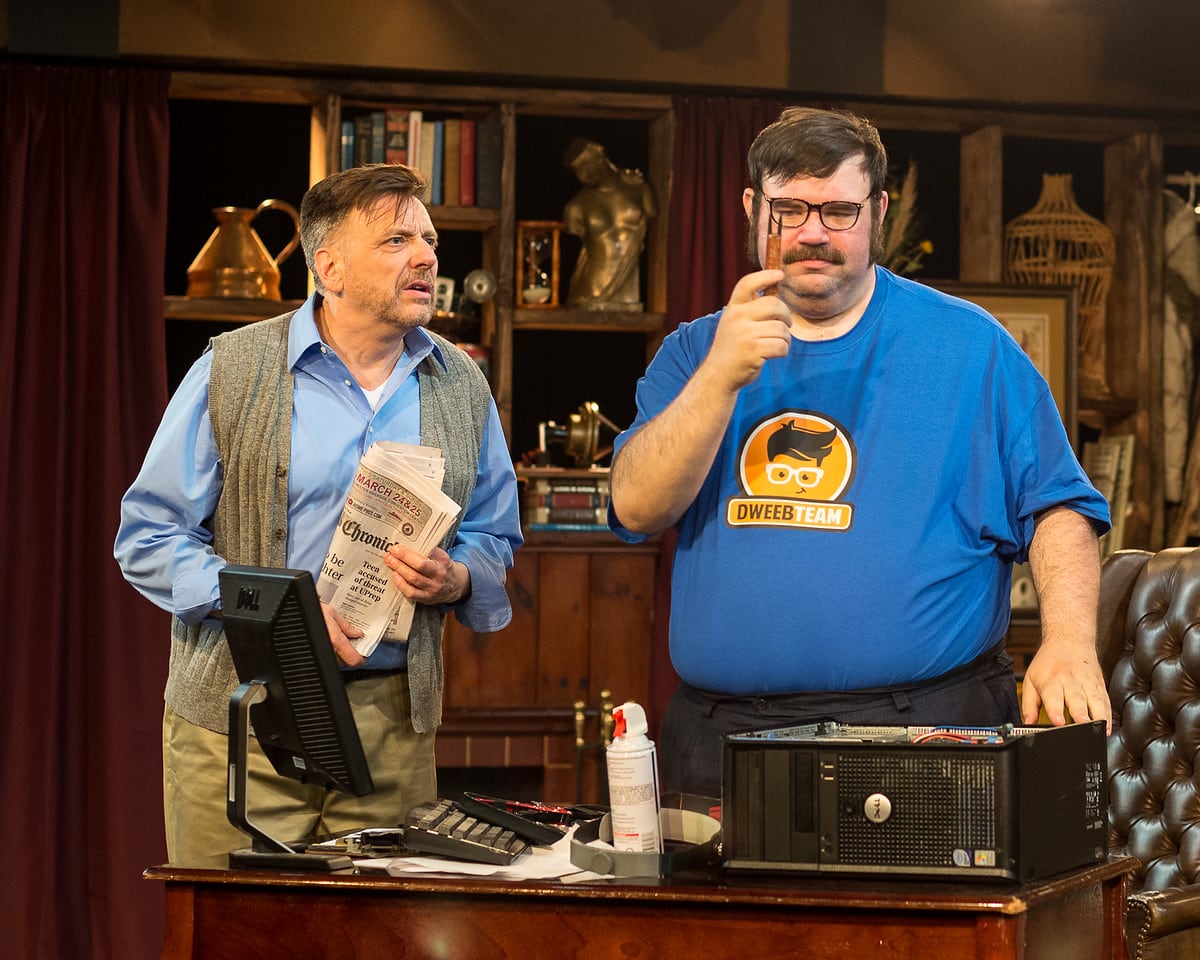Thematically, The (curious case of the) Watson Intelligence is simple and relevant: the frightening trend toward rejecting selfless, mutual, unconditional love with a person in favor of a mechanical invention that doesn’t require reciprocation or sacrifice. Stylistically, however, award-winning playwright Madeleine George illustrates this theme in a complex, abstract and slightly psychotic way. In the end, the theme feels simpler than the road the audience must take to get there. But who said bumps in the road can’t be fun? Such is the case with this Silver Spring Stage production.

The name Watson evokes different images based on one’s interests: Sherlock’s conscience, Alexander Graham Bell’s phonograph designer or the supercomputer who competed against reigning champion Ken Jennings on Jeopardy. All of these Watsons are quintessential unsung heroes, who find tremendous satisfaction as sidekicks for fascinating, diabolical geniuses, happy to be the wind beneath their respective wings. In The (curious case of the) Watson Intelligence, there is a fourth Watson, one that ties the “I exist to make you happy” theme together: Josh Watson (Michael Abendshein), a fictional computer tech from the fictional Dweeb Team (with company t-shirts, natch) who makes house calls and considers Applebee’s the best restaurant, ever. Josh is pleasant, open, emotionally accessible, non-judgmental, thoughtful, and honest. All he wants is to make others happy, be it through fulfilling a woman’s every need or jimmying a motherboard. His sincerity is so genuine, it’s repugnant.
One actor plays all of the Watsons, as is the playwright’s intention, and Abendshein works hard for that top billing. He is on stage for every moment of the play until the very last scene, including some risqué costume changes, and switches between four characters without so much as a drink of water. As Josh, he sits comfortably in the skin of this man whose definition of success does not include finances or status. He is at once vulnerable and quirky, charming and unassuming, and hurt and indignant, playing every beat with truth. Abendshein is arguably cast against type, but his Josh steadfastly believes that he is a great catch, and the actor believes it too. As Dr. Watson of 221B Baker Street, Abendshein struggles to maintain a British accent and the stylized manner of 19th century London, longing to return to American soil. At times, Abendshein’s natural inclination toward contemporary theater takes him out of the moment as he struggles to keep it real while somewhat distracted by the accent requirement. Once he relaxes into the role toward the end of the play, however, he is, once again, all in.

Jenn Robinson plays Eliza Merrick in all three time periods, and has contrasting strengths to Abendshein. As the Eliza in the late 1890s, Robinson is radiant, believable and perfectly British as the wife of a psychotic inventor who has come to Sherlock Holmes for help in finding out what her husband has planned. She instead finds Dr. John Watson, and ends up opening up to him more than a proper Brit like herself is accustomed to doing. Her naturally straight back, perfect British dialect and cool facial expressions are exquisite. She appears more comfortable in cumbersome period clothing (beautifully selected and arranged by Costume Designer Asia McCallum) than in a cotton shirt and jeans, her look as the creator of modern-day Supercomputer Watson. Her mannerisms, speech and emotional beats as the creator of the “perfect companion” take a few scenes to settle down, and only when expressing Eliza’s utter disbelief and physical pain associated with opening her heart does Robinson emerge. It is there that she beautifully captures her personal tragedy of trusting a computer to “never leave you” more than a human being. She programs her hardwired companion to say all of the things that her ideal man would say, but when a real person actually speaks them, she runs scared, back to the falsehood of a mechanical relationship. The irony, of course, is that her one true love, Supercomputer Watson, ends up being less faithful than the man she despises for being “too perfect.”
Mickey MacIntyre, as two versions of Frank Merrick, is so funny that one could imagine paying full price to watch him read the phone book (if one can find the few left in print). He stays connected and grounded in his characters, both baffled narcissists who want to punish their wives for despising them, despite the fact that both Franks are despicable. MacIntyre has a gift for dropping the f-bomb comically every time it emerges from his character’s loud, self-important mouth, getting one of the biggest laughs of the night when he screams at Josh, “Well f*** you, Deepak Chopra!” MacIntyre‘s body language and comic timing are addictive, not to mention the layers he adds to his characters that one cannot glean off of a page of script. He masterfully crafts his phrases and musings with punches, gestures, and faces that give away his deep-seated self-loathing, while evoking hysterical laughter from the audience.

Director Seth Ghitelman’s use of physicality pops up unexpectedly and delightfully, most notably when Supercomputer Watson mirrors its owner Eliza’s head movements. When given the option to go for the cheap laugh, he takes it, and it ends up being priceless. In one breaking the fifth-wall moment, he utilizes a member of his stage crew to help MacIntyre change costumes on stage, topping it off by applying an excessive amount of aerosoled hair sludge onto MacIntyre’s head so he can slick it down into a more diabolical ‘do. The amount of prop-swapping and furniture movement during Act I drags some scene changes past the point of comfort, likely also serving to mask the complex costume changes occurring backstage. The lags are much briefer in Act 2, which helps the audience stay in the moment and get swept up in the emotions of the final scenes.
Set designer Leigh Rawls creates a visually simple concept with great attention to detail. Her set is comprised of built-in shelves all across two walls which she dresses with tchotchkes large and small, to mirror the clutter inside the minds of the characters. Rawls’ well-chosen set dressing items combined with Sonya Okin and Brendan Murray’s props flesh out the concept of a diabolical mad scientist/detective’s home. Lighting Designer Bill Strein and Sound Designer Rich Frangiamore use their considerable talents to create mood, intrigue and pop references, notably the audio track of Alex Trebek hosting Jeopardy the night that Supercomputer Watson challenged reigning champion Ken Jennings. There are also some familiar cell phone noises interspersed throughout the modern moments of the show, reminiscent of the dinner table in a house full of teenagers.
It takes a very grounded and balanced person to manage the benefits of technology with the simplicity of human emotions, a feat made especially challenging by today’s communication shorthand, which infuses us with verbal laziness and eliminates the need for perseverance and patience. All of the Watsons in The (curious case of the) Watson Intelligence are lone rangers in their understanding that nothing can replace humanity and the work it takes to maintain relationships. Seems the sidekick is the genius after all.
Running Time: Approximately two hours, with one 15-minute intermission.
The (curious case of the) Watson Intelligence runs weekends from April 13 – May 5, 2018, at Silver Spring Stage, 10145 Colesville Road, Silver Spring, MD 20901. Performances are Fridays and Saturdays at 8:00 PM and Sundays, April 22 and 29 at 2:00 PM. Talk-back sessions will follow the Sunday performances. For tickets, contact the box office at (301) 593-6036, or go online.




